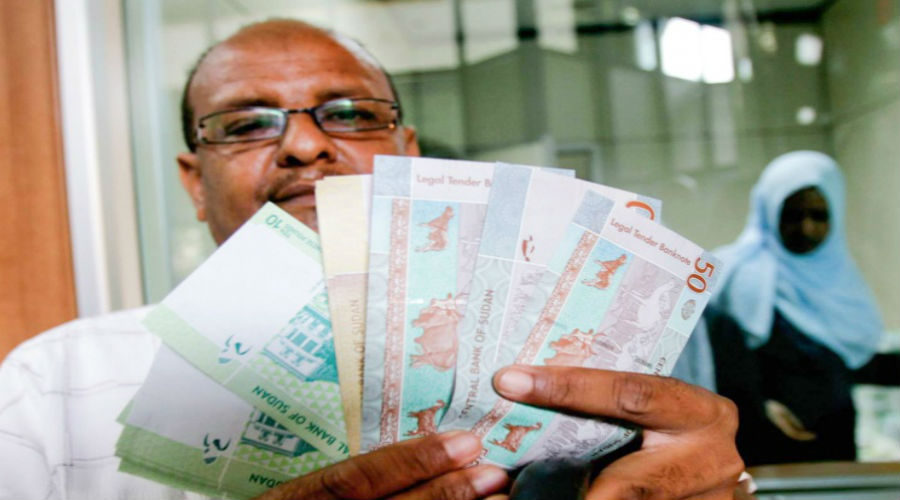Sudan grapples with an acute economic crisis, as the inflation rates spiked to unprecedented levels in the past months, causing a severe liquidity crunch due to the cash-strapped banking system. This has coincided with the constant plummeting of the Sudanese pound against the dollar in the past period.
The current compound crisis has ensued from the drop in the country’s oil export revenues in the wake of the secession of South Sudan in 2011, while other resources, such as gold, have not been able to fill the growing trade deficit. To contain this crisis, the government should continue its efforts to adhere to its recent economic reform program and to strengthen monetary and fiscal policies to address the existing economic distortions.
Continuous Pressures
The unprecedented inflationary pressures on the Sudan peaked in September, when inflation hit 68.64 per cent compared to the same month last year, which means consumers face significant rises in the prices of goods and services in the market. In parallel, domestic demand for bank notes increased, which was not fulfilled by the banking system, causing a severe liquidity crisis in the banks in the past weeks.
Previous developments coincided with the recent fall of the exchange rate, as the gap between the local currency rate in the formal and parallel markets widened dramatically, pushing the central bank to devaluate the pound to 47.5 against the dollar. That measure was taken after the establishment of a new independent panel, to regulate the exchange rate of the pound against foreign currencies, comprised bank managers, heads of foreign exchange companies and prominent economists.
Strikingly, economic conditions have not improved as expected following the partial lifting of US sanctions against Sudan in October 2017. Levels of economic growth and foreign investment fell short of expectations, amid the slowdown in efforts to reform the investment climate and improve monetary and fiscal policies in the country.
Numerous Factors
Sudan’s foreign currency crunch is attributed to the sharp decline in oil exports in the aftermath of the South Sudan secession in 2011. Efforts to boost foreign exchange resources from other sources, such as gold, to fill this gap, have not achieved significant results, as evident in the limited revenues of gold exports of 100 tons worth USD 400 million last year, as well as the slow foreign investment flows to the country in the past years.
Against this backdrop, fiscal deficits have soared in the past years, peaking in the past year by 1.8 per cent of gross domestic product (GDP). Furthermore, it is projected to increase to 2.1 per cent in 2018, due to a lack of government revenues, the bulk of which was oil.
The trade balance has continued to run deficits in the past years amounting to about USD 3.2 billion in 2017, albeit less than USD 4.2 billion in 2016. Under such deficit, foreign currency reserves eroded and hit an all-time low in 2016 of USD 875 million (enough to cover about 1.4 months of imports).
In fact, the authorities had no choice, but to devaluate the pound against the dollar about four times since 2016 to date, from 8 to 47.5 against the dollar at the current price. Yet, the government’s efforts to halt this free fall by restricting access to foreign currency have not achieved the desired results.
Crisis Containment
The government is taking urgent measures to remedy the previous economic situation. First, it is introducing an urgent 15-month economic reform program that includes measures to rationalize government expenditures and to abolish all tax exemptions with the aim of tackling the growing budget deficit. The second is printing a new 100-pound banknote to meet domestic demand for cash in response to soaring inflation rates.
The third is to increase subsidy for vital commodities such as flour. The government has recently decided to increase subsidy for the flour to 35 million pounds per day instead of 25 million in the past, in a bid to contain any possible repercussions of rising inflation on the price of bread, which may spark popular protests again.
The fourth is the government-led diplomatic and political efforts to convince the US to take Sudan off the state sponsors of terrorism list to provide an opportunity to revive the economy by attracting more foreign investment. However, the current US administration has tied this move to numerous conditions, including Khartoum’s doing further reforms in the fields of counter-terrorism and human rights.
Apparently, the government is counting on China, as Sudan’s most important trading and investment partner, to inject more capital into the market, stimulating the economy and providing more jobs.
In addition, Sudan is making great efforts to bolster its trade and investment partnerships with many regional and international powers, such as Turkey and Russia, to attract foreign investment in various sectors, especially oil, gas, mining and others.
To overcome the current economic crisis, the government should adhere to the economic reform program, which aims at boosting government revenues and improving the performance of monetary policies. This program can ultimately enhance international confidence in the coming period.


